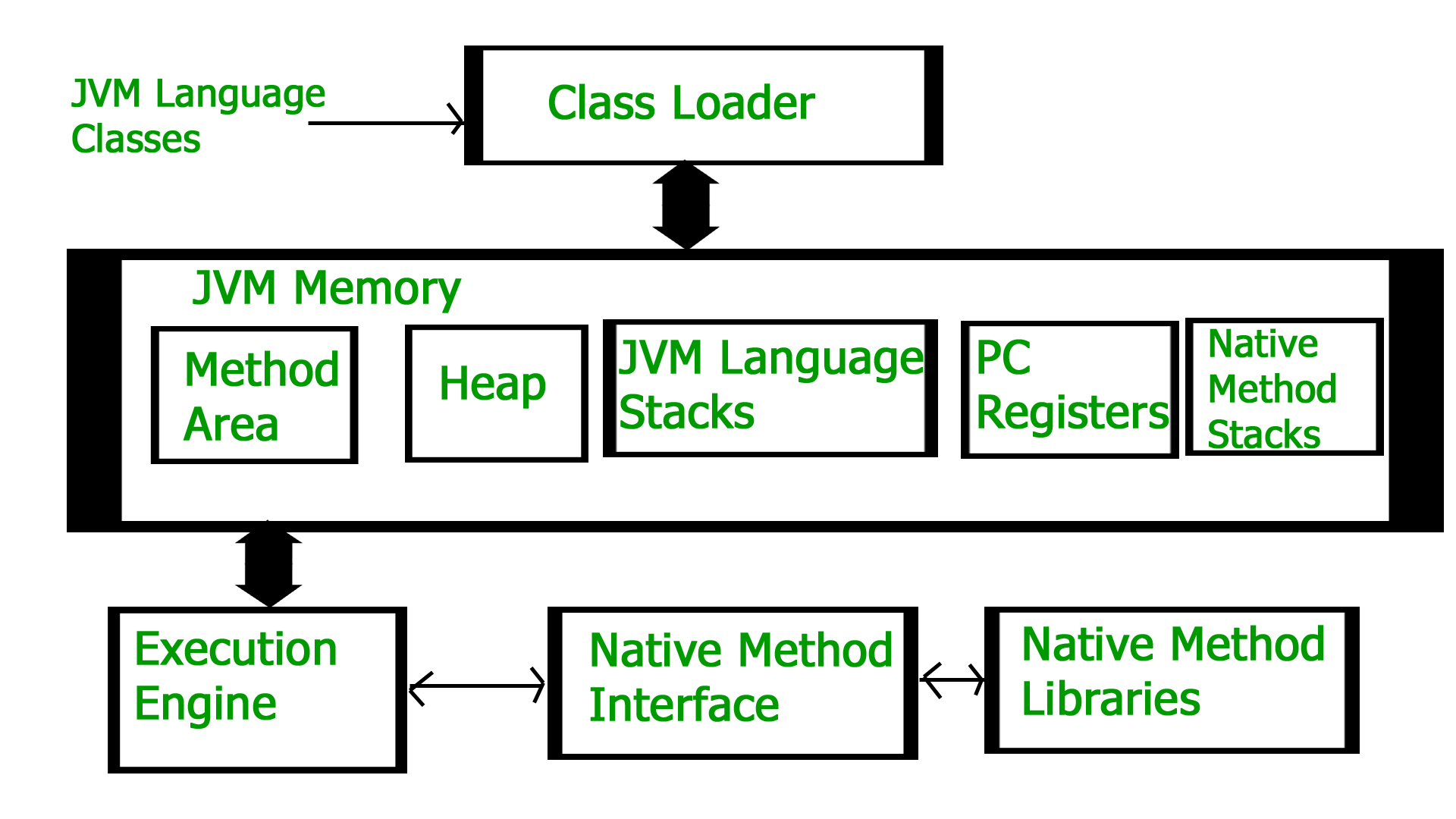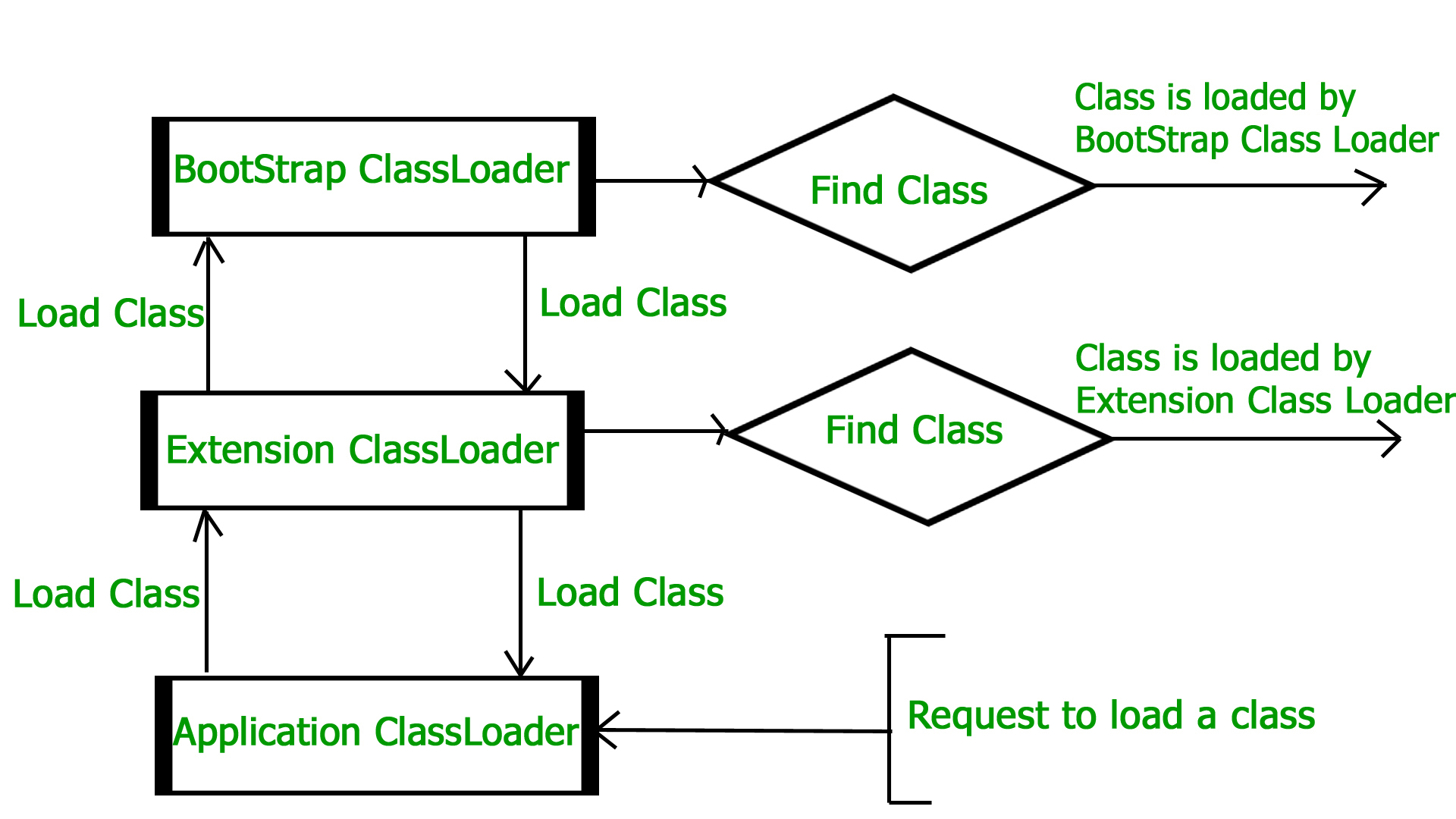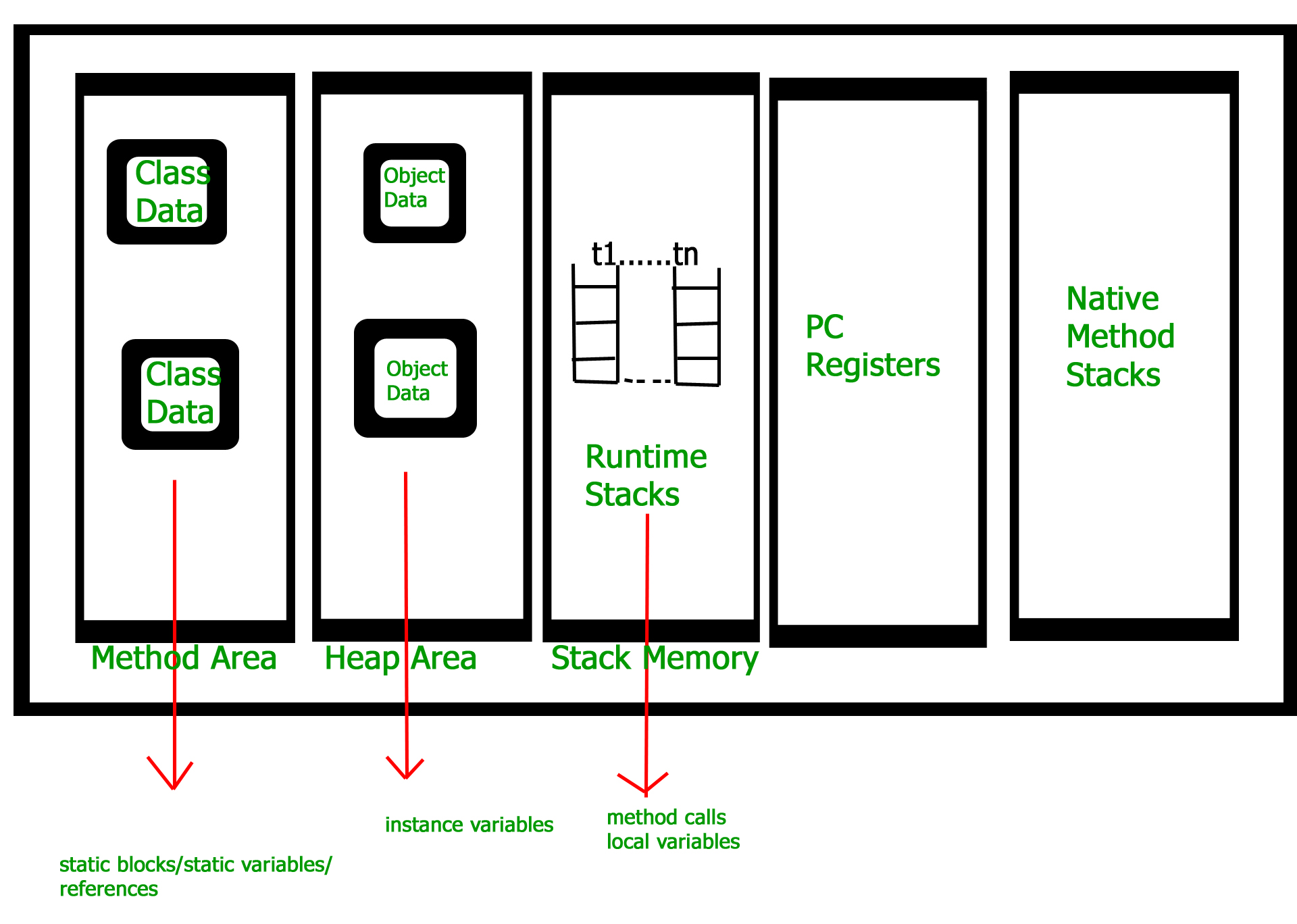JVM Architecture : Working of JVM
What is Java Virtual Machine (JVM) ?
- It acts as a run-time engine to run Java applications.
- It is the one that actually calls the main method present in a java code.
- JVM is a part of JRE(Java Runtime Environment).
- Java applications are called WORA (Write Once Run Anywhere).
- We can develop Java code on one system and run on any other Java enabled system without any adjustment. This is all possible because of JVM.
- When we compile a .java file, .class files(contains byte-code) with the same class names present in .java file are generated by the Java compiler. This .class file goes into various steps when we run it. These steps together describe the whole JVM.

The 3 major section that the compiled program goes through when it is run are:
- Class Loader Subsystem
- JVM Memory
- Execution Engine
Class Loader Subsystem
It is mainly responsible for three activities.
- Loading
- Linking
- Initialization
1. Loading
- The Class loader reads the .class file, generate the corresponding binary data and save it in method area.
- For each .class file, JVM stores following information in method area.
- Fully qualified name of the loaded class and its immediate parent class.
- Whether .class file is related to Class or Interface or Enum.
- Modifier, Variables and Method information etc.
- After loading .class file, JVM creates an object of type Class to represent this file in the heap memory.
- Please note that this object is of type Class predefined in java.lang package.
- This Class object can be used by the programmer for getting class level information like name of class, parent name, methods and variable information etc.
- To get this object reference we can use getClass() method of Object class discussed in other important concepts section.
package com.learn.java.sec1.jvm_architecture;
import java.lang.reflect.Field;
import java.lang.reflect.Method;
class Student {
private String name;
private int roll_No;
public String getName() {
return name;
}
public void setName(String name) {
this.name = name;
}
public int getRoll_no() {
return roll_No;
}
public void setRoll_no(int roll_no) {
this.roll_No = roll_no;
}
}
public class ClassObjectJVM {
public static void main (String[] args) {
Student s1 = new Student();
// Getting hold of Class object created by JVM.
Class c1 = s1.getClass();
// Printing type of object using c1.
System.out.println("Name of class: " + c1.getName());
// getting all methods in an array
System.out.println("\nAll the Declared Methods of the class: ");
Method m[] = c1.getDeclaredMethods();
for (Method method : m) {
System.out.println(method.getName());
}
// getting all fields in an array
System.out.println("\nAll the Declared Fields of the class: ");
Field f[] = c1.getDeclaredFields();
for (Field field : f) {
System.out.println(field.getName());
}
}
}
Output:

Note:- For every loaded .class file, only one object of Class is created.
Student s2 = new Student();
// c2 will point to same object where c1 is pointing
Class c2 = s2.getClass();
System.out.println(c1==c2); // true
2. Linking
- It Performs verification, preparation and (optionally) resolution.
- Verification:
- It ensures the correctness of .class file i.e. it check whether this file is properly formatted and generated by valid compiler or not.
- If verification fails, we get run-time exception java.lang.VerifyError.
- Preparation:
- JVM allocates memory for class variables and initializing the memory to default values.
- Resolution:
- It is the process of replacing symbolic references from the type with direct references.
- It is done by searching into method area to locate the referenced entity.
3. Initialization
- In this phase, all static variables are assigned with their values defined in the code and static block(if any).
- This is executed from top to bottom in a class and from parent to child in class hierarchy.
- In general, there are three class loaders :
- Bootstrap class loader:
- Every JVM implementation must have a bootstrap class loader, capable of loading trusted classes.
- It loads core java API classes present in JAVA_HOME/jre/lib directory.
- This path is popularly known as bootstrap path. It is implemented in native languages like C, C++.
- Extension class loader:
- It is child of bootstrap class loader.
- It loads the classes present in the extensions directories JAVA_HOME/jre/lib/ext(Extension path) or any other directory specified by the java.ext.dirs system property.
- It is implemented in java by the sun.misc.Launcher$ExtClassLoader class.
- System/Application class loader:
- It is child of extension class loader.
- It is responsible to load classes from application class path.
- It internally uses Environment Variable which mapped to java.class.path.
- It is also implemented in Java by the sun.misc.Launcher$AppClassLoader class.
- Bootstrap class loader:
public class Test {
public static void main(String[] args) {
// String class is loaded by bootstrap loader, and
// bootstrap loader is not Java object, hence null
System.out.println(String.class.getClassLoader());
// Test class is loaded by Application loader
System.out.println(Test.class.getClassLoader());
}
}
Output:
null
sun.misc.Launcher$AppClassLoader@73d16e93
Notes:
- JVM follow Delegation-Hierarchy principle to load classes.
- System class loader delegate load request to extension class loader and extension class loader delegate request to boot-strap class loader.
- If class found in boot-strap path, class is loaded otherwise request again transfers to extension class loader and then to system class loader.
- At last if system class loader fails to load class, then we get run-time exception java.lang.ClassNotFoundException.

JVM Memory
Components of JVM Memory
- Method area :
- In method area, all class level information like class name, immediate parent class name, methods and variables information etc. are stored, including static variables.
- There is only one method area per JVM, and it is a shared resource.
- Heap area :
- Information of all objects is stored in heap area.
- There is also one Heap Area per JVM. It is also a shared resource.
- Stack area :
- For every thread, JVM create one run-time stack which is stored here.
- Every block of this stack is called activation record/stack frame which store methods calls.
- All local variables of that method are stored in their corresponding frame.
- After a thread terminate, it’s run-time stack will be destroyed by JVM.
- It is not a shared resource.
- PC Registers :
- Store address of current execution instruction of a thread.
- Obviously each thread has separate PC Registers.
- Native method stacks :
- For every thread, separate native stack is created.
- It stores native method information.

##Execution Engine
- Execution engine execute the .class (bytecode).
- It reads the byte-code line by line, use data and information present in various memory area and execute instructions.
- It can be classified in 3 parts:
- Interpreter:
- It interprets the bytecode line by line and then executes.
- The disadvantage here is that when one method is called multiple times, every time interpretation is required.
- Just-In-Time Compiler(JIT):
- It is used to increase efficiency of interpreter.
- It compiles the entire bytecode and changes it to native code.
- So whenever interpreter see repeated method calls, JIT provide direct native code for that part so re-interpretation is not required, thus efficiency is improved.
- Garbage Collector:
- It destroy un-referenced objects.
- Refer Garbage Collector.
- Interpreter:
Java Native Interface (JNI).
- It is an interface which interacts with the Native Method Libraries and provides the native libraries(C, C++) required for the execution.
- It enables JVM to call C/C++ libraries and to be called by C/C++ libraries which may be specific to hardware.
- Native Method Libraries:
- It is a collection of the Native Libraries(C, C++) which are required by the Execution Engine.